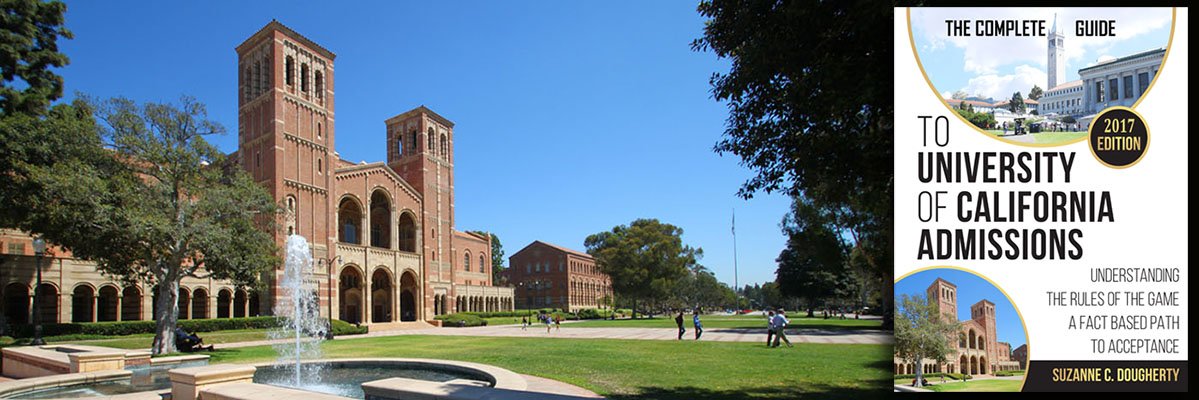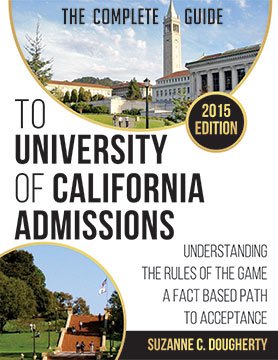How to get into University of California
Q & A with UC school expert: How to get into University of California
The competition to get into University of California (UC) Schools is tougher than ever. UC Berkeley is the world’s top public university according to the ARWU 2015, ranking fourth overall. UCLA is the second top public university followed by UC San Diego as third and UC San Francisco as fifth. These four UC’s also place within top 20 overall among the likes of Ivy Leagues and prestigious private schools.
knows these statistics and other UC-related data better than anyone else.
Dougherty, in the process of writing a new book that covers all California Colleges, will soon be launching The Complete Guide to University of California Admissions for 2016. Obsessed with numbers and data related to University of California admissions, friends dubbed “a walking encyclopedia of UC statistics.” Her enthusiasm and passion for helping students make her a great match for her role as Independent Academic Advisor. In her journey to make the UC admissions process as transparent as possible, she was awakened to the extreme disadvantage children face who cannot afford an advisor, and now everything she does for students is all volunteer.
Here is our Q&A that reveals the intricacies of the UC School System and how to get in.
Q: What is your perspective on how students should spend time outside the classroom?
SD: Look beyond admissions and think about your future. High School is the best time to seek out and develop your interests and talents to pursue further in college and after. You never know where your favorite hobby or pastime might lead you. Not everyone knows the background story of GoPro founder, Nick Woodman, who was admitted to Berkeley but rejected from UCSD. As a surf fanatic he appealed to UCSD and gained admission. “We couldn’t believe we got to wake up every morning and surf Black’s,” Woodman says. “Then we’d go to class, and then surf Black’s, and then go to class.” After graduation from UCSD Muir ‘97, Woodman planned a surf trip to Australia and Indonesia. He wanted to relive the inspiring lifestyle of surfing he experienced while at UCSD. Woodman started toying with a wrist strap that he could attach to a camera, and document what he thought might be his last epic surf adventure. GoPro today is valued at $2.9 billion. What if he had never pursued surfing or if he had gone to Berkeley?
Full Article in Los Angeles Times HS Insider CLICK HERE for full article
Q: Many students participate in enrichment programs, leadership programs or academic programs during the summer (for example National Youth Leadership). Do leadership/academic conferences held at prestigious colleges enhance students’ chances of getting into UC’s?
Warning, do not fall for heavily marketed, overpriced, un-selective programs, such as the “National Young Leaders Conference.” If a letter you receive about a summer program starts off with “Congratulations! You are nominated! It’s an honor. (It’s a sales pitch)” —NEW YORK TIMES . Beware of programs designed to take advantage of students desperate to pad their academic resume and boost admissions chances; they do neither. Many Ivy Leagues and other selective universities rent their facilities to camps each summer, and students can be misled to believe a program is elite or selective based on its location on i.e. Brown, Harvard, Berkeley or Stanford’s campus. Look beyond the program location for evidence of the value or prestige. The more selective programs track their alumni to their undergraduate destinations. Ask to see the program alumni matriculation data.
Instead, here is a list of some reputable programs, many very selective. Think of the summer as a time to explore new interests, develop skills or pursue an area of passion. Applications usually open at the start of the New Year for summer. Some of the following programs are highly competitive but offer enormous opportunity to explore an area you may be interested in studying in college. (Many of these are currently mentioned on the Cal Tech website as programs many of their admitted students participated in. MIT is known to be especially fond of the NASA Sharp program attendees as well as National Science Olympiad participants.)
Academically Oriented Programs that will add value to your application. Scholarships are available for most.
- COSMOS (California State Summer School for Mathematics and Science)
- UCSB Research mentorship program – Summer research for high school students
- UC Summer Sessions – college courses at any UC
- Community College – Take college level courses
- AMC (American Math Challenge)
- AIME (American Invitational math exam)
- National Science Olympiad
- LEAD Engineering
- Summer Science Program (SSP)
- Research Science Institute (RSI)
- Minority Introduction to Engineering Entrepreneurship and Science (MITES)
- Women’s Technology Program (WTP)
- The Ross Program
- Program in Mathematics for Young Scientists (PROMYS)
- Canada/USA Math Camp
- Nano Business Talent Program
- NASA SHARP Program at the jet propulsion lab
Q: Many people aim for UC Berkeley, USC, and UCLA because they’re at the top of the rank. How important are college rankings and do they matter?
The University of California System is known throughout the world, and has an outstanding reputation, both nationally and internationally, for many programs. What follows are just a handful of current rankings. Rival Private School, University of Southern California, is included below to emphasis how the public University of California system ranks above many private schools such as USC by most accounts.

Use rankings as a third-party gauge of which school is worth your investment, the same way colleges use standardized tests as a third-party measure of a student’s college preparedness. Decide which areas are the most important to you then…
Make your own list and rank the schools by YOUR STANDARDS
- Graduation rates
- Student happiness (sophomore return rate & student reviews)
- Cost (Debt)
- Housing (Availability, Cost and Safety)
- Campus safety (and surrounding area)
- Prestige (International/National Rankings)
- Academic program offerings
- Location (Urban, College Town, Beach Town)
- Student population
- Alumni giving rates (Alumni satisfaction)
- Male/Female student ratio
- Course availability (impacted)
- Research opportunity (schools with smaller graduate student populations rely more heavily on undergraduate student participation for research)
Q: Some of the students turned away from competitive UC’s are admitted to Ivy League schools. Why does this happen?
Each year California students are broken-hearted over rejections from the top UC campuses. But did they accurately predict their chance for admission? Most students do not have enough time while racing through high school to also educate themselves about each schools selectivity. Limited time combined with the UCs prevalent promotion of the bare minimum requirements have left many students and parents perplexed about their true chances for admission. The thread “Chance me for UCLA vs Ivy League” on College Confidential will bring you a range of random predictions from anonymous posters, many sharing inaccurate or out of date information.
The best bet for admission to many private schools is through the Early Notification admission choices that many Ivy League schools offer. Single Choice Early Action, Early Action and Early Decision all offer a higher chance for admission than Regular Decision. (The UC only offers regular decision) When compared to the Early Decision rates at the Ivy League, you can see why there are times that you may hear that a student has been rejected from UCLA but admitted to Brown or Columbia.

Try not to fixate on one school. Although you can only attend one, you could be happy at many.
The decisions that lock in students early, are designed for those who do not need to weigh all financial aid options before selecting a school. I applaud the UC for sticking with one fair, single choice of regular decision. I hope this remains the same for years to come! Go To UC!
Q: What were some of the most eye-opening things you discovered about the UC System?
I’m surprised and delighted to learn of the growing number of Entrepreneurship programs on each UC campus devoted to helping students launch successful startups while still in school. Startup accelerators such as Berkeley Skydeck, UCLA Blackstone, UCSB TMP, UCSD The Basement to name just a few, are working with student startups from all disciplines.
Q: What is the part of the application process you wish students would focus more on?
Students polish their personal statements to perfection then rush through the short answer sections for extracurricular, awards, and work sections. I see this first hand on the scholarship applications I have read for UCLA. Far too many waitlist statements and supplemental questionnaire sections are left blank because they are labeled “optional”. If those areas read “extra credit” instead of “optional” students would fill them in. Every blank space is a missed opportunity for extra credit.
Q: What is your take on the “portfolio lockers”? When is it too early to start thinking about college?
I believe it’s important to establish a college going mindset early; getting students excited about college is important. It’s never too early to let them know the University of California (combined with state and federal aid) has scholarships available that can make college affordable for all students regardless of parental income.
As for the “portfolio locker” developed by CollegeNET in partnership with the Coalition; I foresee well-to-do private high schools setting up meetings beginning freshman year, for students to look through all of their work and talk with scores of private counselors about what should go in their portfolio. The students of private high schools will have beautiful, polished portfolios. However local public school students with counselor to student ratio of 500-1? If this takes off CollegeNET will be sitting on an enormous pile of valuable data. I would like to know more about how that data will be used. It doesn’t sound simple to me.
Q: What makes your book stand out from other resources?
The first edition of my book “The Complete Guide to University of California Admissions” has been well received. It is fact based, data rich and very specific to the University of California. All of the valuable feedback I have received from students and parents has made the next edition even better, including lots of additional information added in response to specific feedback received. What makes the book unique is the narrow focus solely on the University of California system; explaining the UC application, selectivity, requirements and things you can do to improve your chance of admission.
Q: Many speculate that there is a higher standard for Asian students to get into college. In your studies of UC Schools, is this double standard true?
Unlike the Common Application, revealing your Ethnicity, National Origin or Religion is entirely optional on the UC Application. The only place it appears is in the scholarship section of the application. Students with financial need can elect to leave this section blank and they will still be considered for Alumni Scholarships, University Grants, Federal Pell Grants and Cal Grants among many others.



